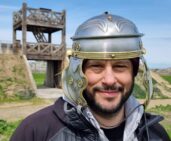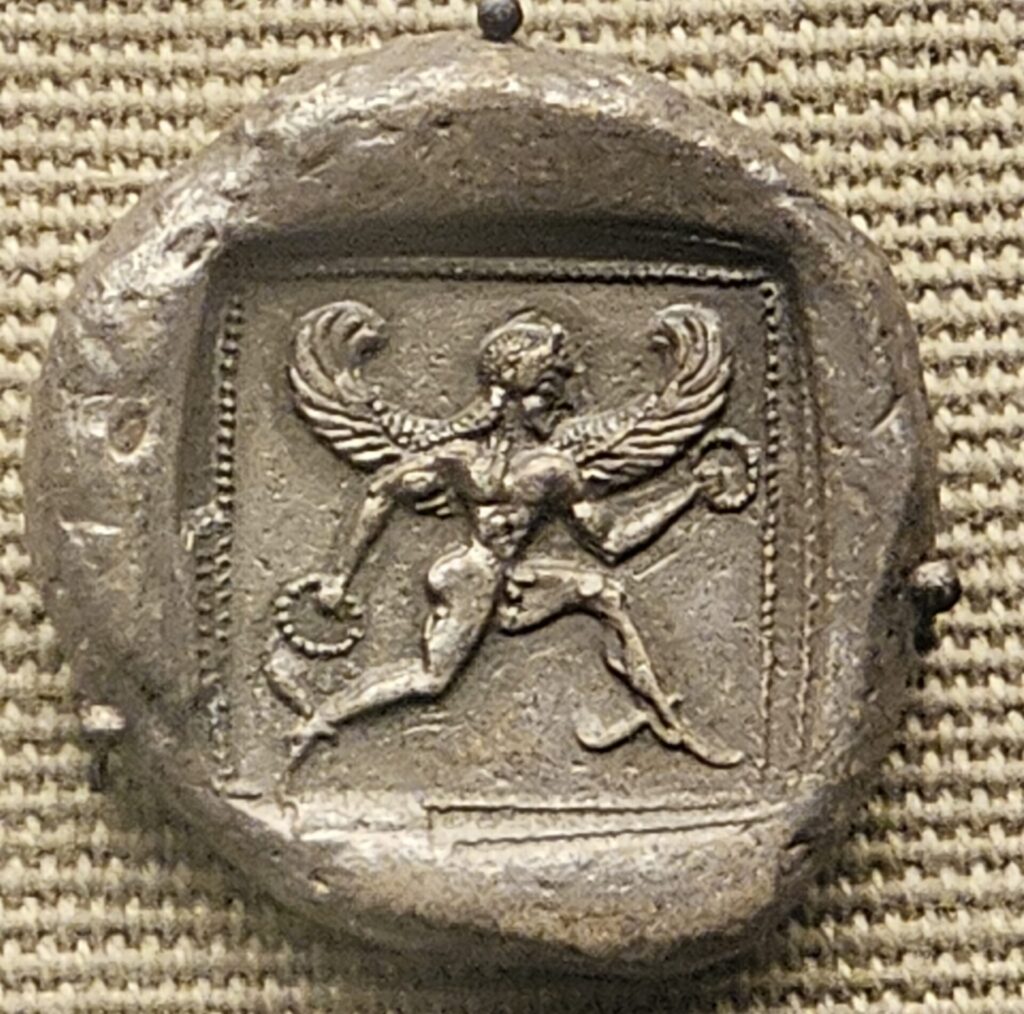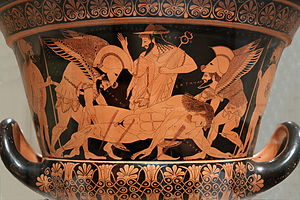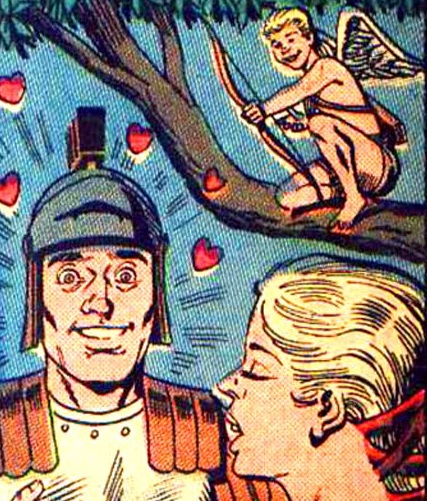Boreas and bad weather.
In his Works and Days, the poet Hesiod, writing in the 8th century BC, noted how bad the weather could be in the month of Lenaion (January/February). This was largely attributed to one character, Boreas the god of the north wind. According to the poet his winds would pierce the hides of oxen and bring down thick branched pines. In a wonderful turn of phrase, he wrote that:
“He makes the old man bend, round shouldered, as a wheel”.
It wasn’t just Greeks who had this association. Ovid also wrote of how he’d send gnarled oaks crashing and hurled down hailstones. He was also associated with cold weather.
“When Boreas blows, then winter grips the land with frost”
The associations and character of Boreas was therefore a continuous one which writers across the centuries had commented on. Callimachus, in the 3rd century BC, made the harsh cold weather he brough a central characteristic. In his Hymn to Artemis he wrote of “the hurricane of Boreas bringing evil breath of frost to cloakless men“. And yet he still required respect as a deity. In Athens the Tower of the Winds was built around 50 BC. Upon this Boreas is depicted as a god with wings, a shaggy beard and bellowing cloak. He also holds a conch. Though this was constructed within the Roman period the Athenians of the Classical Age had an affinity for Boreas which I’ll come to later.
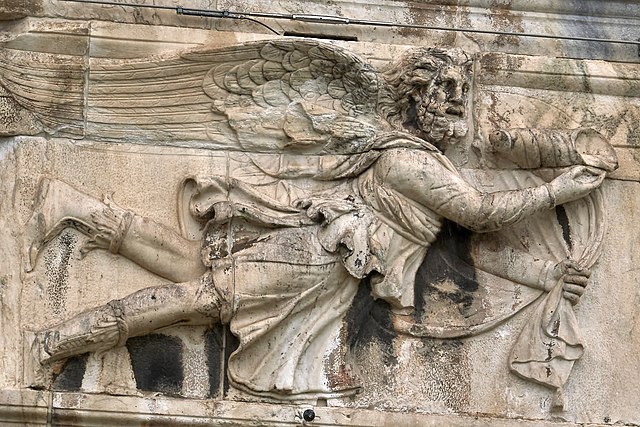
Boreas and his brothers.
The ancient Greeks didn’t only find space for a god of the north wind. There was also the east wind (Euros), the south wind (Notos) and the west wind (Zephyrus). Together they were known as the Anemoi or ‘winds. Each had its own character and personality. Boreas, safe to say, was a more destructive and angry character, though as you’ll read, he might be a useful ally to have.
The parents of Boreas and his brothers were Eos and Astraeus. You may recognise Eos from the Iliad, she was often referenced there as ‘rosy dawn’. As a goddess of the dawn you might think her passive, but in fact she was often associated with the pursuit of mortal men (you can read my piece on her here). The other parent, Astraeus, was the god of stars and planets. Here then is the theme of the sky which links the parents and their sons.
In myth.
One of the earliest references to Boreas is in the Iliad where he and the other winds are appealed to by Achilles when lighting the pyre for Patroclus. It seems there’s an issue with a lack of a breeze and so Achilles makes the correct appeal and voila, the fire takes hold. A more direct interaction forms the basis of one of his main myths. This involved the abduction of Oreithyia, a daughter of Erectheus, a legendary king of Athens. This incident forged a relationship between Athens and Boreas and one which Athens would appeal to and which I’ll mention shortly.
Though Boreas’ strength, a literal force of nature, wasn’t in question it could be his weakness. A fable by Aesop recounted how Boreas and Helios decided to have a competition to see which one was stronger. A random traveller was chosen as the unfortunate target with the premise that whichever could remove his cloak would be the winner.
Boreas went first, try as he might the more he blew the tighter the traveller pulled his cloak. When it was Helios’ turn the warmth made him release it. Helios was the winner. Presumably the message here was that people are more likely to take a suggestion or do what you wish them to if you are kind, rather than cruel. An interesting side note to this is that the fables of Aesop have been argued as providing political guidance in instances where there was a tyrant. Rather than point out where a tyrant was incorrect (never a clever thing) it was easier to deliver the advice in the form of a fable. Hopefully the tyrant in question would get the hint.
Home at Thrace.
Though a Greek deity Boreas was said to live on the edges of what the Greeks might consider their world. This was Thrace, a region in antiquity which covers modern day eastern Greece, southern Bulgaria, and western Turkey. The Thracians were viewed by the Greeks as uncivilised and very volatile, albeit that’s the picture Herodotus painted of them. They were often at war with each other and elsewhere seem to have been happy with violence. For example, upon his death a nobleman’s wives competed with each other to be honoured as his favourite. The winning spouse was killed and buried with her husband (read here about a fantastic treasure hoard found there).
Seneca in his play Oedpius even seems to have felt sorry for the Thracians with Boreas as a neighbour.
“Those wandering tribes (the Thracians) whom neighbouring Boreas smites”.
Exactly where Boreas lived isn’t clear. Though this didn’t stop writers from speculating where his home in Thrace might be. Pliny the Elder thought he resided near a tribe called the Arimaspoi. These were a mythical tribe, named after the Sycthian word meaning ‘one eye’. Pausanias, citing Prokonnesos (a poet in the 7th century BC), added that they fought griffins over gold (Pausanias.I.24). The Arimaspoi were linked to the Ripaean Mountains, possibly the Carpathians and perhaps the point here is that the exact location isn’t important. What was important was that he lived on the edges of the Greek world. Indeed it was reckoned that to the north of his home was the mythical land of Hyperborea.
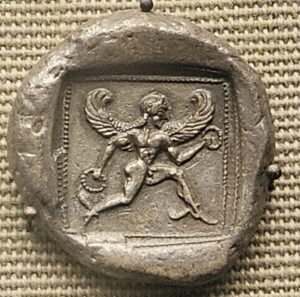
Boreas in battle.
Like many deities in ancient Greece Boreas was linked to real world events. The Greeks saw their deities not just in mythical tales but in their own experiences. The Athenians were said to have appealed to him during the Persian invasion led by Xerxes. But what exactly could a wind god do against an army? Perhaps not much, he could make things very uncomfortable. But what he could do to a navy might be much worse.
The Persian naval force was in anchor just off Chalkis on Euboea when a storm whipped up scattering ships and sinking others. This lasted for three days and affected not just the military ships but many supply vessels. The Athenians, as Herodotus commented, felt they could appeal to Boreas because of his connection to them through Orithyia.
The Athenian colony of Thurii in southern Italy made a similar claim, albeit decades later, when Boreas was credited with destroying much of a fleet sent against them. Where the Athenians had set up an altar or sanctuary to him near the Ilisos river Thurii gave him a house, plot of land and made him an honorary citizen.
There is a reference to Boreas saving or aiding Megalopolis, a city in Arcadia against Sparta. Pausanias wrote that he was given high honours there for helping against Agis. Presumably this refers to Agis III (as the previous Spartan kings called Agis weren’t alive when Megalopolis was founded in 371). In 331 BC the Macedonian general Antipater and his forces defeated Agis III who died on the battlefield. There’s no reference I could find which explains exactly how Boreas influenced this battle.
For the ancient Greeks deities were everywhere and often with conflicting characteristics. You might benefit or suffer from them equally; in the case of Boreas is was more the latter but he was still a well regarded god. Extra points for the beard and cloak!
